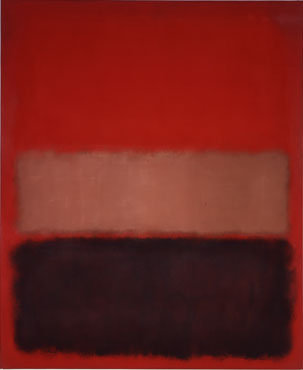Taste of the Modern
dal 10/10/2007 al 13/9/2008
Segnalato da
10/10/2007
Taste of the Modern
Nasher Museum of Art at Duke University, Durham, NC
Rothko, Rauschenberg, Oldenburg, Kline. As part of a special loan from the Museum of Contemporary Art, Los Angeles, six important works by four major American artists of the 1950s and 1960s will be on view, showcasing America's creative energies in Abstract Expressionism and Pop Art. Curated by Anne Schroder.

Rothko, Rauschenberg, Oldenburg, Kline
curated by Anne Schroder
Six important works of the later 1950s and early 1960s
will be on view for one year at the Nasher Museum of Art at Duke
University, on special loan from the Museum of Contemporary Art, Los
Angeles. The show opens Oct. 11.
“Tastes of the Modern: Rothko, Rauschenberg, Oldenburg, Kline” includes
significant examples of post-World War II modern art by four major
American artists. Included are an “abstract sublime” painting by Mark
Rothko, two paintings by Robert Rauschenberg, two sculptures by Claes
Oldenburg and a gestural “action painting” by Franz Kline.
“I am pleased to bring these six seminal works to Durham,” said Kimerly
Rorschach, the Mary D.B.T. and James H. Semans Director of the Nasher
Museum. “These are significant examples of abstract expressionism and pop
art created during one of the most revolutionary decades of American art,
when the United States was becoming an international leader in the modern
art world.”
The six works are part of the Panza Collection at the Museum of
Contemporary Art, Los Angeles, acquired from Count Giuseppe Panza and his
wife Giovanna in 1984. The Milan-based Panzas were among the first
Europeans to collect contemporary American art, starting their collection
in 1956. When their collection of more than 100 works was acquired by the
Museum of Contemporary Art, Los Angeles, it was described as one of the
world’s most important museum acquisitions of modern and contemporary art.
Rothko’s 1957 painting “No. 46 [Black, Ochre, Red Over Red]” exemplifies
his expression of pure emotion through color and abstraction with
luminous, floating blurred rectangles of vibrant colors suspended against
a colored ground. Rothko, who died in 1970, was one of the major figures
of the New York School of Abstract Expressionists, highly influential for
subsequent generations of American painters.
Kline, who died in 1962, was another important member of the Abstract
Expressionist group. He was best known for his large canvases with broadly
gestural strokes of black paint -- “action paintings” -- for which he
often used utilitarian housepaint brushes. Kline’s 1957 work “Hazelton,”
is named for a town in the coal mining region of Pennsylvania; it is one
of several paintings that Kline named after cities.
Rauschenberg began producing sculptural assemblages of ordinary objects,
which he called “combines” in reference to their combinations of “junk”
items and gestural brushwork, around 1954. “Slow Fall” explores
simultaneous actions of climbing and falling, implying aspiration and
struggle. The feathered bird wing in “Painting with Grey Wing” (1958) was
recently described by art historian and critic Tom Crow as suggesting “the
soaring flight of youthful aspiration.”
Oldenburg, who was born in Sweden, drew inspiration from the streets of
New York, with its shop window displays and commercial advertisements.
Oldenburg began producing painted plaster reproductions of everyday
objects and commodities, such as “Hamburger with Pickle and Olive” (1960)
and “Pie à la Mode” (1962). Both works are made of plastered muslin over
wire frames, painted with enamel paints. Oldenburg’s later oversized
sculptures of foods and household objects (such as “Typewriter Eraser”
previously on view at the Nasher) have a slicker, more manufactured look.
Nasher Museum of Art
2001 Campus Drive - Durham



